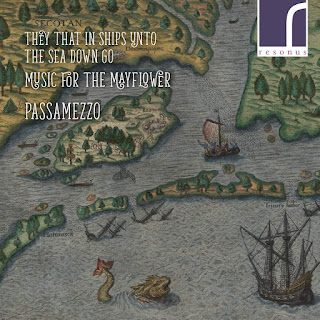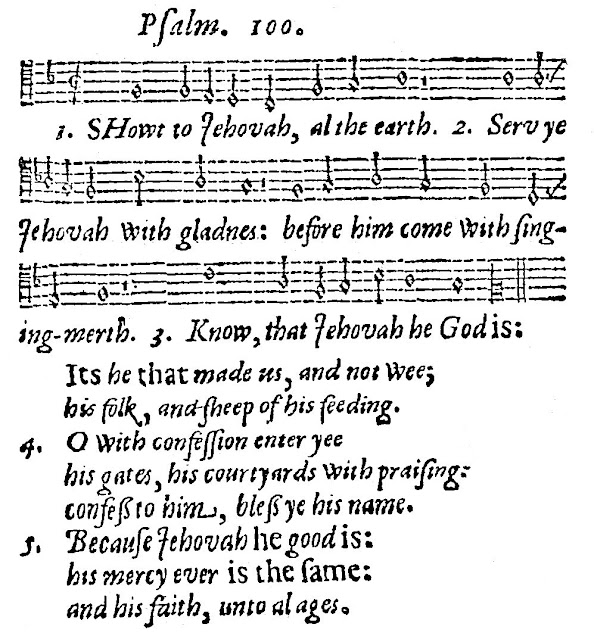They that in ships unto the sea go down: Music for the Mayflower; Passamezzo; Resonus Classics
Reviewed by Robert Hugill on 5 July 2020 Star rating: (★★★½)
An imaginative recreation of the sometimes surprising music that might have been heard on The Mayflower
Thanks to Oliver Cromwell and his cohorts we tend to think of the Puritans as being completely down on music, but dissenters were just as varied as the rest of humanity. Research on the libraries of the early settlers in America has revealed that the passengers of the Mayflower, which left England in 1620 to take a varied group of separatists, merchants, their families, their servants and their apprentices to seek a fresh start in the New World, carried with them at least four books of music.
A disc from the early music group Passamezzo, They that in ships unto the sea go down: Music for the Mayflower, on Resonus Classics, explores the music that might have been performed on board ship, including works by Richard Allison, John Dowland and Thomas Campion.
Reviewed by Robert Hugill on 5 July 2020 Star rating: (★★★½)
An imaginative recreation of the sometimes surprising music that might have been heard on The Mayflower
Thanks to Oliver Cromwell and his cohorts we tend to think of the Puritans as being completely down on music, but dissenters were just as varied as the rest of humanity. Research on the libraries of the early settlers in America has revealed that the passengers of the Mayflower, which left England in 1620 to take a varied group of separatists, merchants, their families, their servants and their apprentices to seek a fresh start in the New World, carried with them at least four books of music.
A disc from the early music group Passamezzo, They that in ships unto the sea go down: Music for the Mayflower, on Resonus Classics, explores the music that might have been performed on board ship, including works by Richard Allison, John Dowland and Thomas Campion.
Unsurprisingly, there were at least two copies of the 1612 edition of Henry Ainsworth's Book of Psalmes Englished both in Prose and Metre. Ainsworth was a dissenter, like those on board the Mayflower, and he had moved to the Low Countries to escape persecution. As well as the English texts, Ainsworth's book included unharmonised melodies and his book would be used for worship in Early Modern America. For tunes, Ainsworth uses rather grave melodies culled from France, Geneva and Strasbourg. This disc includes a number of these, sober pieces performed with one voice and a group of instruments, though in the 17th century they were probably just as likely to be heard sung in a robust unison by a group of voices.
At least one other book of English psalms was present on the Mayflower, The Psalms of David in Meter published in 1599 by Richard Allison (1560/70 - c1610). This book is designed for a consort of voices, or voices and instruments and like the consort songs of John Dowland, it is published in table book format so a group of performers could sit round a table and perform the music from the single copy. We know that the early Dissenters included instruments in their psalm singing, so the presence of this book is perhaps not as surprising as it might seem. The tune to Psalm 100, 'Show to Jehovah all the earth' will be very familiar indeed as it passed into the English hymnal as the Old 100th (see image below, courtesy of Passamezzo website)
We hear four works by Allison on the disc, including The Lord's Prayer, and each is a striking combination of sober respectfulness and the consort song, one can easily imagine a group sat around a table singing and performing these.
Slightly more surprising is the presence of The golden garland of princely pleasures and delicate delights Wherein is conteined the histories of many of the kings, queenes, princes, lords, laides, knights, and gentlewomen of this kingdome. Being most pleasant songs and sonnets to sundry new tunes now most in use: the third time imprinted, enlarged and corrected by Rich. Johnson. Divided into two parts.
This is not a religious book but a collection of secular song lyrics, collated by the writer Richard Johnson (1573-c1659). The first part contains fifteen ballads telling tales from history, and the second contains fourteen song. There is no music in the book, just the song lyrics with tune indications, but amongst the ballads are lute songs as well.
The disc includes two of the historical ballads, one about the dastardly deeds of Richard III and the other, an attractive part-song about the tragic fate of Lady Jane Grey and Lord Guildford Dudley. We also hear The Shepherd's Pipe, which is John Dowland's Sleep wayward thoughts from his First Book of Ayres (1597), under another name; and the tunes of Thomas Ford's Since first I saw your face and There is a sweet lady pop up as well (heard in instrumental versions on this disc). We do not really know what the book was used for and how it came to be brought over from England, but the sheer variety of the songs in it provides a fascinating glimpse into musical habits.
One of the things taken back to England as a result of these early settlements of America was the use of tobacco as a recreational drug. And by way of variety the disc also includes a selection of 17th century pieces about tobacco. There is a Thomas Weelkes madrigal, Come Sirrah Jack Ho which claims tobacco as a universal panacea, Tobias Hume's striking lute-song Tobacco is like love and the anonymous Song of the Masque of Flowers, which was performed at the wedding of the Earl of Somerset in 1614 and includes in its anti-masque a contest between Silenus, god of wine, and Kawash, god of tobacco, a highly characterful piece
The performers also include the lively broadside ballad, London's Lotterie (complete with the spoken rubric from the ballad) from 1612 which encouraged people to do their patriotic duty and buy into the lottery to enable just such a voyage to be funded! And of course there were sailors on the Mayflower too so there are one or two songs with a nautical theme on the disc just to round things off. The recital finishes off with Thomas Campion's Never weather beaten sail; it has no known connect
Intriguingly, as well as acquiring the CD you can also buy the sheet music in a new edition edited by Tamsin Lewis (who wrote the booklet note), from Rondo Publishing.
This is an intriguing and sometimes surprising programme which sheds an interesting sidelight on the sober dissenters from the Mayflower, singing their psalms but also perhaps indulging in other lighter fare. The programme has been nicely crafted, so that for the casual listener there is judicious amount of variety, with one or two delightful curiosities. Passamezzo is a versatile group with a number of them doubling on voice and instruments, and they create an intimate and conversational atmosphere to the whole disc.
They that in ships unto the sea go down: Music for the Mayflower
Music by Richard Allison(c1565-c1606), John Dowland (1563-1626), Tobias Hume (c1579-1645), Thomas Ford (c1580-1648), Thomas Campion (1567-1648)
Passamezzo (Eleanor Cramer soprano & bass viol, Richard de Winter tenor, Robin Jeffrey lute & cittern, Alison Kinder viols & recorders, Tamsin Lewis violin, viols & alto, Linda Sayce lute, viols & recorders, Peter Willcocks bass)
Recorded at St John's Wood Church, London, 21-23 October 2019
RESONUS CLASSICS RES10263 1CD [61:23]
Elsewhere on this blog
- French seasons and a Belgian violinist: I chat to Anna Ovsyanikova about her explorations of violin repertoire and her new disc - interview
- Lyrical English pastoralism and more: the choral music of Owain Park showcased by The Epiphoni Consort on Delphian - CD review
- Il gondoliere Veneziano:
A musical voyage through Venice - baritone Holger Falk evokes the
musical world of the 18th century gondolier in this imaginative disc - CD review
- Seductively original, neither completely new nor completely old: The Red Book of Ossory from Anakronos on Heresy Records - CD review
- The English Pre-Restoration Verse Anthem:
Fretwork & the Magdalena Consort continue their exploration of
these intimate works for voices and viols on Signum Classics - CD review
- Politics, Poetry & Personal Interest: Lully, King Louis XIV and the invention of French opera - feature
- Renowned
as a pedagogue & the Royal Academy of Music's first cello
professor, there is a lot more to Alfredo Piatti: I chat to cellist
Adrian Bradbury about rediscovering Piatti's forgotten operatic
fantasies - interview
- Smoked beer, ETA Hoffmann and the Bamberg Symphony Orchestra: Tony explores the picturesque Upper Franconian town of Bamberg - feature article
- Icelandic experimentalism: Guðmundur Steinn Gunnarsson's Sinfonia explores non-traditional tunings and alternative notations - CD review
- Best
known as a conductor and orchestral composer, Sir Hamilton Harty's
expressively melodic songs are explored by Kathryn Rudge and Christopher
Glynn - CD review
- Intimate beauty: Iestyn Davies and Elizabeth Kenny in Elizabethan lute song, Purcell, Mozart and Schubert at Wigmore Hall - concert review
- 'Home



.jpg)









No comments:
Post a Comment